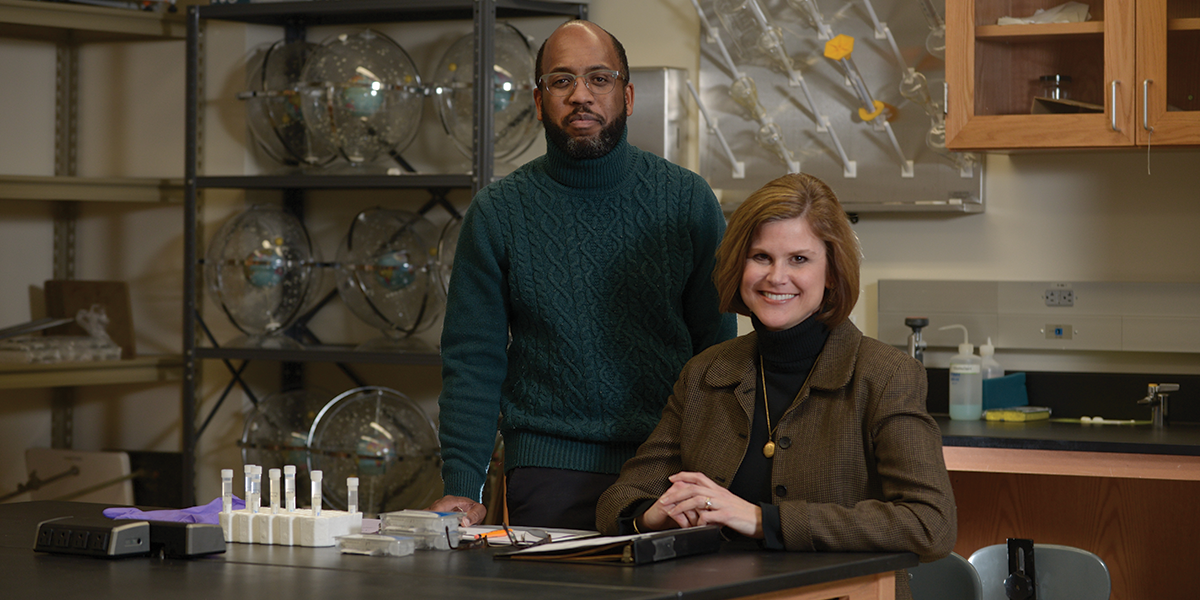Exploring a Link between DNA and Forgiveness
Gerald Griffin, Ph.D. | Assistant Professor of Psychology and Biology
Charlotte vanOyen-Witvliet, Ph.D. | Professor of Psychology
Lindsey Root Luna, Ph.D. | Associate Professor of Psychology
Jill VanderStoep, M.S. | Adjunct Professor of Mathematics
Imagine this: You tell a friend something important in confidence, only to have that friend breach your trust and gossip about you with others. It was wrong, and it hurts. A collaborative research project underway at Hope College suggests that your reaction to unsettled conflicts and your ability to forgive those who wronged you may not only be the result of your values. It could also be influenced by your genetic makeup.
Psychologists Dr. Charlotte VanOyen-Witvliet and Dr. Gerald Griffin knew of the link between oxytocin and empathy and had read some of the literature focused on how hormones rewire the brain. “We wanted to see if we could extend this idea to forgiveness, since empathy is an important part of the forgiveness process,” says Griffin, a neuroscientist who teaches both psychology and biology at Hope. VanOyen-Witvliet has conducted research on empathy and forgiveness for 20 years, so in 2017 they got to work.
Witvliet and Griffin assembled a Hope College research team that spans departments and generations. Psychologist Dr. Lindsey Root Luna, who was Witvliet’s student when she attended Hope, was involved in design and analyses. Professor Jill VanderStoep of the Department of Mathematics contributed statistical expertise. Rounding out the team, 11 students involved in psychology or biology research at Hope played a vital role in carrying out the research. The researchers expect this interdisciplinary approach to contribute much more to the field than they could have accomplished if they’d stayed in their own silos.
A grant from the college’s Frost Research Center supported the pilot study.
Griffin and Witvliet began by analyzing samples of their own saliva, along with a sample from one of the student research assistants. Next, they confirmed accurate genotyping — that is, extracted DNA and used a technique called quantitative polymerase chain reaction to determine the particular DNA code that each of the three individuals has at a particular location in his or her DNA. Then they began a project with 200 saliva samples from students enrolled in psychology, health dynamics and neuroscience courses.
After providing saliva samples, the participants completed a computerized survey and writing exercise. The researchers asked each individual to recall — relive, even — a real-life offense against them that triggered a conflict that remains unresolved. The participants also were asked to do two things: focus on ways they could genuinely desire their offender’s “good change” (a compassionate reappraisal), and focus on ways that they had personally grown through facing the hardship (a benefit-focused reappraisal). The participants’ responses helped the researchers determine each participant’s forgiveness traits.
There may be some biological underpinning that can make it harder for some people to forgive others.
Other researchers have asked experimental subjects to do these types of reappraisal, but combining them back-to-back in this study extends that prior research, Witvliet says. “We were curious about which intervention would actually bring the participant closer to forgiving the person — did the order in which they were asked matter?” Griffin says.
Dr. Griffin trained student researchers to examine each saliva sample for a single nucleotide polymorphism (SNP) on the oxytocin receptor gene, which has been associated with human individual variation in empathy behaviors. Their lab analysis involved extracting the DNA from the saliva, purifying the DNA, and determining the DNA concentration as well as the particular genotype each individual had in this particular SNP.
Laboratory analysis is continuing, but Griffin and Witvliet report that the team’s research to date indicates that genetics are associated with individuals’ forgiveness of their offenders.
That doesn’t mean, though, that genetics control whether a particular person will hold grudges or forgive. DNA may make empathy harder for some people — but not impossible.
“If we start to speak about it that way, then we can appreciate the efforts people go through to be able to forgive,” Griffin says. “We’re all at different starting points.”
Wittvliet notes that effective counseling interventions exist that help people forgive and learn to modulate their emotional responses and behavior, across genotypes. “This could give additional information to a therapist or clinical psychologist in order to better understand their patients and their struggle with these types of behavior,” Griffin says.
They also see relational ramifications, and hope that the findings of this study will enhance people’s understanding of others who have difficulty demonstrating empathy and forgiveness.
“I have to see you as a human again in order to forgive you. And I have to recognize that I, too, need to be forgiven,” Griffin says. “For some people, it’s harder to connect with others from the start. How can we begin to peel that away?”

